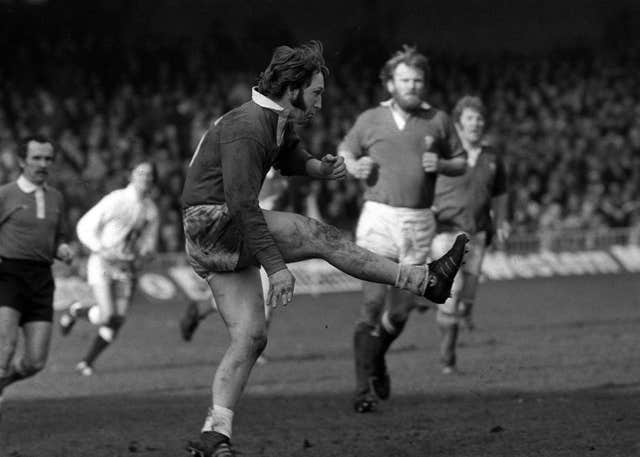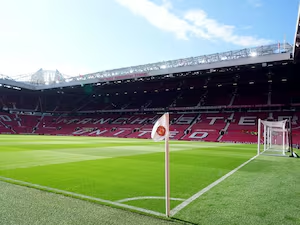Former Wales and British and Irish Lions full-back JPR Williams dies aged 74
Williams won 55 Wales caps and started all eight Tests on victorious Lions tours to New Zealand in 1971 and South Africa three years later.

Former Wales and British and Irish Lions full-back JPR Williams has died at the age of 74.
Williams, a fearless player known for his aggressive and attacking style, won 55 Wales caps and started all eight Tests on victorious Lions tours to New Zealand in 1971 and South Africa three years later.
He was revered among fellow Wales greats like Sir Gareth Edwards, Phil Bennett and Gerald Davies, and regarded as one of rugby union’s finest players.
His death was announced by Bridgend Ravens, a club that Williams served as a player and club president.
“Bridgend Ravens are devastated to announce the passing of JPR Williams,” the club said in a statement on their website.
The family then said in a statement to the BBC: “JPR died peacefully today at the University Hospital of Wales surrounded by his loving wife and four children, after a short illness, bravely battling bacterial meningitis.
“The family request privacy at this difficult time.”
The Bridgend statement continued: “An icon of the world game, John Peter Rhys Williams served Bridgend Ravens as a player and most recently as club president.
“He was capped 55 times for Wales and made eight Test appearances for the British and Irish Lions.
“Highlights of his illustrious career included winning two Schweppes Cup titles with Bridgend in 1979 and 1980, and three (Five Nations) Grand Slams in 1971, 1976 and 1978 for Wales.
“Following his retirement from the game, JPR became a key figure of the club’s administrative team, serving as Bridgend Ravens club president – a role he held until his passing.
“JPR’s passing leaves a huge void at the club, and our thoughts are with his friends and family at this sad time.”
Williams made his Wales debut against Scotland in 1969, with his final Test match appearance coming against the same opponents at Murrayfield 12 years later.

Williams was a key part of the Lions team that recorded a 2-1 series triumph over New Zealand in 1971 – it is a feat that no Lions team has repeated – dropping a goal in the fourth Test that ended 14-14 and ensured a series success.
He was equally as prominent on the 1974 South Africa tour, which the Lions took with three wins and a draw, showcasing his quality throughout.
Williams also starred for the Barbarians in their unforgettable 23-11 victory over New Zealand in 1973, touching down in a game chiefly remembered for Edwards’ spectacular touchdown that completed a breathtaking length-of-the-field move.
Williams’ club career included a memorable eight-year stint at London Welsh, when the Exiles were a major force in British rugby.
“All at London Welsh RFC are deeply saddened by the news this evening that rugby legend JPR Williams has passed away,” the club said.
“Our thoughts and condolences go out to his friends, colleagues and family. A huge loss to all who knew and loved him.”
Williams, who captained Wales on five occasions, was made an MBE for his his contribution to the sport.
And he continued playing into his early 50s, lining up for village club Tondu before finally calling it a day in 2003.
The Lions, meanwhile, paid a glowing tribute to Williams, describing him as “a man who inspired so many”.
“One of the greatest ever Lions,” the Lions posted on X. “A man who inspired so many.
“It is with huge sadness to learn that JPR Williams has passed away at the age of 74.
And the Barbarians said: “Very sad news as we lose one of rugby’s greats. A man who will always have a special place in the hearts and history of our club.
“Rest in Peace, JPR.”
World Rugby posted on X: “One of the greatest players the game has ever seen. JPR Williams leaves behind an incredible legacy. All our thoughts are with his family and friends.”
Welsh Rugby Union president Terry Cobner, who played alongside Williams for Wales during 1976 and 1978 Grand Slam campaigns, also paid tribute.
“The world of rugby has lost one of its greatest players of all time, a man who revolutionised full-back play over an international career of 12 years,” Cobner told the WRU website.
“He was the defensive rock in every team in which he played, the counter-attacking inspiration and the man who feared nothing and never saw a lost cause. We all thought he was ‘Mr Indestructible’.
“Although he played during the amateur era, he was thoroughly professional in his sporting outlook and always drove standards in training and on the field.
“With JPR in your side, there was always a chance of winning anything.”





